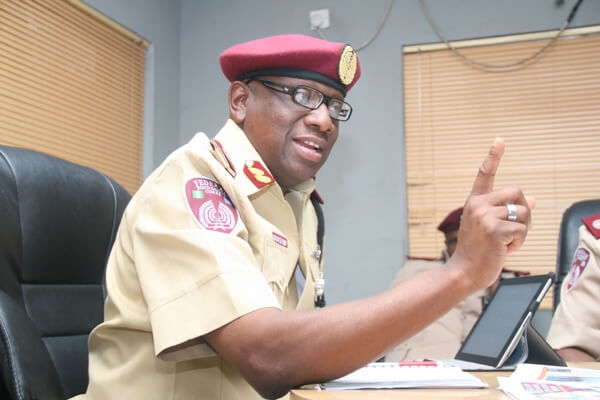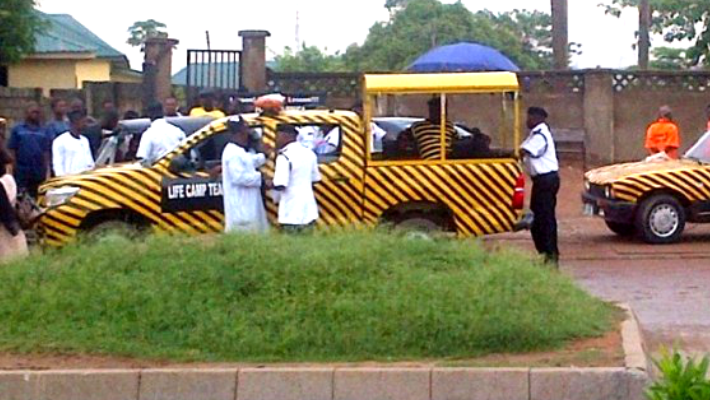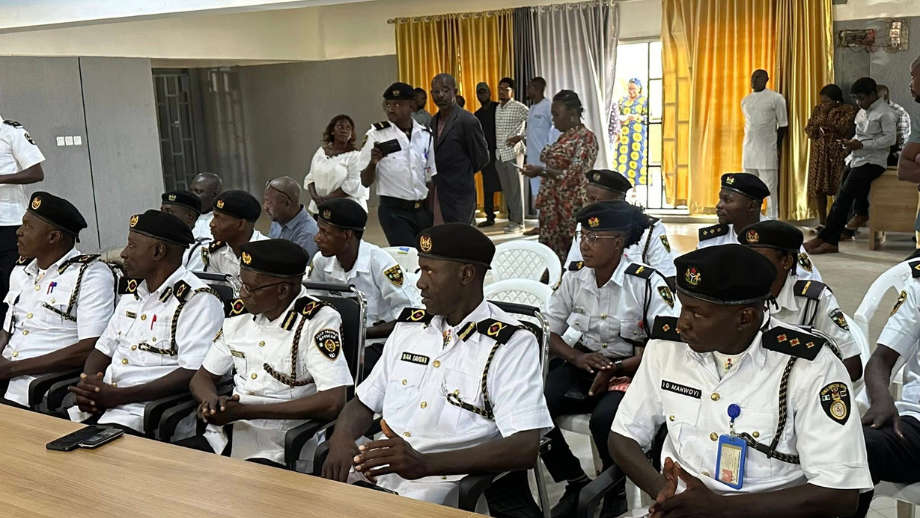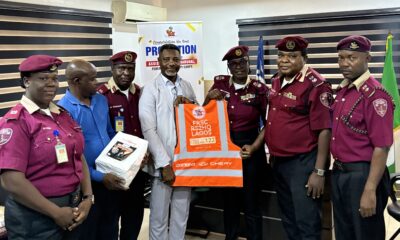Auto
No engineering defects on Otedola Bridge, overloading major cause of tanker accidents – FRSC boss, Oyeyemi

The Corps Marshal of the Federal Road Safety Corps, Boboye Oyeyemi, in this interview with some journalists in Abuja, including NewsTrends, speaks on the frequency of tanker accidents, enforcement of safety helmet among motorcycle riders, speed limiting device, among other issues.
Going by the high of number road accidents ascribed to speed, will it not be right to say the FRSC crusade of encouraging motorists to install speed limiting device in their vehicles has failed?
That is the matter of the moment. This year is the year of enforcement and full compliance with the speed limiting device. We’ve seen from the data that 52 per cent of the accidents recorded in Nigeria today are speed-induced crashes. Innocent people are dying. And many of them are lone crashes. Why? The roads are getting better. For instance, the Lagos-Ibadan expressway, the completed portions look like runway to motorists. People go on testing the capacity of their vehicles. And you know road traffic crash requires just the minutest fraction of a second of lack of concentration; just changing a CD and running into a pothole without having a firm grip on the steering could take the moving vehicle up and result in a serious accident. And because of the speed, it has turned into an aircraft taking off. Vehicles and aircraft move in the same way. The only difference in the aircraft is that the lever is lifted and it takes off and continues. Tyre blowout will make the vehicle to be lifted but because there is no mechanism to propel it up, it comes down and continues; it summersaults either vertically or horizontally. That is why 52 per cent accounts for road crashes in the country today.
The FRSC management has taken a decision to focus on this. We have already given instructions to the field commands to commence full enforcement and compliance with the installation of the speed limiting device. There are more than enough registered speed-limiting device vendors; the prices have crashed because it is being manufactured in Nigeria. The technology has been transferred. There is no going back. I must commend the organized transport sector such as the ABC, God is Good and those that have complied. The problem has to do with commercial drivers. They are the ones carrying the larger members of the public. We need to address this first.
This first quarter, we have raised the level of awareness; even all my activities from the beginning of the year have been focused on the speed limiting device. In my address for the end of the year review, the key thing I focused on was the speed limiting device. Let’s commend the government; the roads are getting better nationwide Lagos-Ibadan road will be completed this year; the Second Niger Bridge construction has gone far; Enugu-Awka-Onitsha is under full reconstruction; Enugu-Port Harcourt; Abuja-Kaduna-Kano; Kano-Maiduguri are undergoing construction.
The presidential directive on the device was 2016; that is six years ago. We must be serious about the compliance. Ideally, we should be getting to about 98 per cent compliance level now and start looking at getting the private vehicle owners to comply. But we have not got the expected level of compliance from the commercial drivers. All this has to do with lives of human beings. If we don’t do it, we’re in trouble.
What is the penalty for failure to install the speed limiting device?
We are still a bit humane for this period. If you don’t install, your vehicle is impounded. You will go to the authorized vendor, pay the prescribed fee and the vendor will come and install it in your vehicle. There is a portal to check those that have complied. The patrol team only needs to check to verify. We will continue to engage the NURTW and other transport unions for full compliance. I must commend the multinationals such as the Nigerian Breweries, Guinness and Dangote; they have complied. Dangote has a fleet of over 7,000 vehicles and they have complied.
How will you access the infrastructural support from the government to the FRSC in the last seven years?
This regime since 2015 has been very supportive. First, in 2016, they approved intervention funds that led to the procurement of about 343 vehicles. There was another approval in 2020, which we are working on now to inject more vehicles to support the operations of the corps. On infrastructure, this is the administration that has devoted more support for the FRSC in terms of release of funds for infrastructural development. Within the seven and a half years, we have constructed, inaugurated and equipped 16 state sector commands. All the abandoned projects in the academy have been fully completed. We now have the four training institutions running; for the road marshal assistants, we have the training school in Jos, to be relocated soon to Shendam. For the Marshal Inspectorate, that was the one inaugurated by Vice-President Yemi Osinbajo last year, which was built for the corps by the people and government of Delta State. All the infrastructure in our academy has been fully completed. We have received the approval of the National University Commission to commence post-graduate degree programmes. All the facilities required for the training of cadets at the post-graduate school are on the ground.
My focus when I came on board was infrastructural development. Every landlord continues to increase their rent. This affects our projections. With these 16 offices fully built, we are out of rent payment. We appreciate Mr President for providing the funds for the projects. We are landlord on our own now. And these are strategic structures in different parts of the country.
Why do you have the same number plate for motorcycles and tricycles?
The Joint Tax Board has just approved that the use of single vehicle number plate for tricycle. This will soon come on board.
Why did FRSC fail in the enforcement of helmets for motorcycle riders?
We did not fail. We have to slow down a bit. When implementing, we met a brick wall in terms of religious and cultural issue. Many of our staff members were physically assaulted and some were killed. So we have to review the situation and be strategic in our implementation. You don’t expose your personnel to such dangers. But now the United Nations is calling for the wearing of safety helmets. It is an approach that we must be tactical about. We will start reaching the unions again. And they have different factions. It requires a tactical approach today because of this cultural issue. It is normal; when you see things that can threaten the peace of the country in implementing a programme, you slow down and review the strategy. But riding a motorcycle without wearing the helmet is like the rider has signed a death warrant. Majority of the injuries from the accidents are head injuries. When government of Lagos State, for instance, banned okada on major roads, the crash rate dropped drastically. Okada riders’ nuisance value is high and worrisome. They are violent and aggressive. And you can’t blame them. They are mostly graduates who are bottled up. They are unemployed people who saw okada as a means of sustaining their family. That is why I said we must be strategic when enforcing the compliance. Most of the states have banned them from the urban areas and restrict them to the fringes. The Highway Code/traffic regulations do not permit motorcycles and tricycles to be on the expressway. And this is one area the minister of works and housing has requested us to do the enforcement.
And why do we have okada? It is the crisis in our public transportation system that brought okada. If the state governments had implemented the resolutions of the National Council on Works and National Council on Transportation to provide and sustain high-capacity buses for public transportation, okada would not have been there. That is why we have appealed to the state governments to address the issue of transportation by providing high-capacity buses for commercial transport. Also, states that have the facility to provide intermodal system should also do this in order to reduce the pressure on the road.
What can be done to ameliorate the frequent tanker accidents on highways?
The frequency is not as alarming as it seems. The data last year is not as high as in the previous year. I must commend the leadership of NUPENG-PTD for this. The issue is that once there is a crash involving a tanker, the situation is worrisome; it usually leads to monumental losses. There was one tanker explosion at a village after Gboko, Benue State, last year; it almost razed the whole village because it was during the dry season.
We have carried out about six studies on why tanker accidents occur on the Otedola Bridge in Lagos; the last one was directed by the Honourable Minister of Works and Housing (Babatunde Fashola). The studies show that there are no engineering defects on the bridge. There was no problem. It’s just that all those tankers are over 30 years. They are aged. We have again seen that most of those tankers were not designed to be pulling 60,000 litres of petroleum products. There is a serious axle load violation. A tanker used to be designed for 33,000 litre product; later it was reviewed to maximum load of 45,000 litres. Now, you see these tankers carrying 60,000 litres, 75,000 litres. NUPENG even told us that some carry 99,000 litres on a road designed for 33,000 litres. This is why our roads do not last up to the expected time. When some of these trucks are climbing, the capacity of the heads cannot pull the load they carry; they end up drawing back and eventually hit the concrete.
Some of the trucks are even designed for oil rigs but they got converted to carry fuel on the highways. There is an agency that is supposed to certify the tankers before allowing them to carry petroleum products. When agencies concerned are not doing what they are expected to do effectively, this is the price the nation pays. The absence of weighbridges on our roads led to this abuse. The same thing with the trailers; a trailer that is supposed to carry 600 bags of cement is seen carrying 1,000 bags of cement. The pressure is on the road. That is why we are working with the Federal Ministry of Works to make sure that the weighbridges are brought back. It is part of the decisions of the National Council on Works that even if we cannot have the full weighbridges, let us have the mobile weighbridges. And randomly, you stop those trucks and check them.
Buy why has the FRSC not been able enforce the compliance by tanker drivers violating the regulations?
Enforcement is a collective responsibility. If you observe when we started dealing with operators of unlatched trailer beds, they stopped travelling in the day time. In three months, we impounded over 3,000 trucks and prosecuted them at mobile courts. In Lagos, they started going through Ikorodu and Ota; they abandoned the expressway. We pursued them. Our advocacy, enlightenment and education with the enforcement are working; at least, there is respite. The key issue now is the compliance with the axle load specification by the articulated vehicles. If there are no weighbridges, the mandatory period the roads are supposed to last will not be achieved. That is why weighbridges and toll plazas are coming back. The minister of works has said so. FEC has approved it. If we have toll plazas, we automatically will have weighbridges. The law is very firm; you must weigh your load and if there is excess, you warehouse it. The toll plaza is also for security administration. It will also bring revenue to the government to maintain the roads.
You now use Dr as an appellation before your name these days. Is your doctorate honorary or academic?
Mine is not honorary; it is academic.
How did you study for a doctoral degree when you are still active in service?
I started the doctoral degree programme in Yola in 2002. I deferred it; went back and completed it. I defended it with my seminar papers. Doctorate is the simplest programme to do. Once you can finish the course work, the seminars can be done at your own time. In my own case, all that I did were road safety-related. You can commission people to get data for you and you do your analysis, proposition and move on.
Auto
Appeal Court Ruling on VIO Limited to Abuja, Not Lagos — LASG

Appeal Court Ruling on VIO Limited to Abuja, Not Lagos — LASG
The Lagos State Government has dismissed widespread claims that a recent Court of Appeal judgment has stripped Vehicle Inspection Officers (VIOs) of their powers across Nigeria, insisting that the ruling applies strictly to the Federal Capital Territory (FCT).
The clarification follows public reactions to a decision of the Court of Appeal, Abuja Division, which upheld an earlier ruling of the Federal High Court restraining Vehicle Inspection Officers and the Directorate of Road Traffic Services in the FCT from stopping motorists, impounding vehicles, or imposing fines.
The judgment triggered viral interpretations suggesting that VIO operations had been outlawed nationwide.
However, Lagos State Attorney-General and Commissioner for Justice, Lawal Pedro, SAN, described such interpretations as legally inaccurate and misleading.
Basis of the Court Decision
According to Pedro, both the Federal High Court and the Court of Appeal premised their decisions on the absence of statutory authority empowering VIO officials in the FCT to stop, impound, confiscate vehicles, or impose fines on motorists.
READ ALSO:
- Terror in Lagos Traffic: Cutlass Gang Unleashes Mayhem on Mile 12–Ketu Road
- FG Drags El-Rufai to Court Over Alleged NSA Phone Interception
- Mystery in Lekki: Police Probe Death of Two Nollywood Crew Found Lifeless in Parked Car
“It is important to understand that the Honourable Judge of the Federal High Court and Justices of the Court of Appeal premised their decision on absence of statutory power conferred on the Respondents to stop, impound or confiscate vehicles and/or impose fines on motorists on roads in FCT Abuja,” he stated.
He noted that the courts did not declare vehicle inspection enforcement unconstitutional in Nigeria, but rather ruled specifically on the legal framework governing the FCT authorities involved in the suit.
Why Lagos Is Different
The Lagos government stressed that Nigeria’s federal structure allows states to legislate on residual matters such as road traffic management and vehicle inspection.
Pedro explained that Lagos operates under the Lagos State Transport Sector Reform Law, which expressly establishes and empowers the Vehicle Inspection Service (VIS).
Section 12(1) of the law authorises the VIS to:
Inspect and regulate the roadworthiness of vehicles
Conduct pre-registration inspections
Issue Road Worthiness Certificates
Collaborate with other relevant agencies to enforce traffic laws
In addition, Section 23(1) provides for penalties against offenders, subject to adjudication before mobile or magistrate courts, ensuring judicial oversight.
Not of Nationwide Effect
While acknowledging that the appellate decision is binding within the FCT, the Lagos government emphasised that it does not have automatic nationwide application.
“The judgment, though binding, is not of general application or of nationwide effect in Nigeria,” the ministry stated.
The state government stressed that VIS officers in Lagos remain legally empowered to carry out enforcement duties under extant state laws.
Wider Implications
The controversy underscores ongoing debates over traffic enforcement powers in Nigeria, particularly the constitutional boundaries between federal and state authorities.
Legal analysts note that unless the Supreme Court delivers a broader pronouncement on the issue, enforcement powers will continue to depend largely on the specific statutory framework establishing such agencies in each jurisdiction.
For now, Lagos authorities insist that vehicle inspection and traffic enforcement operations in the state remain valid and legally grounded.

Appeal Court Ruling on VIO Limited to Abuja, Not Lagos — LASG
Auto
Chanrai Storms Nigeria’s Gas Market, Unveils High-Capacity CNG, LNG Solutions to Power Energy Shift

Chanrai Storms Nigeria’s Gas Market, Unveils High-Capacity CNG, LNG Solutions to Power Energy Shift
By Rasheed Bisiriyu
Nigeria’s drive towards cleaner and more affordable transport fuel gathered fresh momentum on Friday as Chanrai Nigeria Limited formally entered the country’s gas distribution space, unveiling high-capacity CNG and LNG compression technologies in Lagos.
The company, a member of the globally diversified Kewalram Chanrai Group, announced a strategic partnership with India’s Tulip Compression to roll out advanced compressor packages and integrated “single window” CNG solutions aimed at accelerating the Federal Government’s Presidential CNG Initiative.
Chief Operating Officer of Chanrai Nigeria Limited, Anil Sahgal, described the Tulip CNG Compressor Packages as a “game-changer” for Nigeria’s evolving energy landscape.
“With our commitment to safety, efficiency and OEM-grade partnership, we’re empowering the nation to achieve its CNG ambitions while driving economic growth and environmental sustainability,” Sahgal said.
The move marks Chanrai’s expansion beyond its traditional business interests — which span automobiles, agro-products, healthcare and fast-moving consumer goods — into the fast-growing gas infrastructure segment, as fleet operators and industrial users increasingly seek alternatives to petrol and diesel.
Under the partnership, Chanrai Nigeria and Tulip Compression will deliver Compression Station on Single Window (CssW) solutions — integrating compressors, dispensers, storage and stainless-steel tubing under one brand — to simplify deployment and reduce installation timelines.
The compressor packages come in a wide capacity range, from 250 to 4,500 standard cubic metres per hour, making them suitable for small refuelling stations as well as large gas hubs.
A 1,400 SCMH gas engine-driven booster compressor is designed to refuel heavy-duty CNG trucks in about 20 minutes by drawing gas from tube trailers.
The systems are available in both electric motor-driven and gas engine-driven configurations, eliminating the need for large gas generators while ensuring energy efficiency and lower life-cycle costs.
According to the company, the equipment features dual-chamber leak-proof safety systems, advanced sealing technology to eliminate gas loss and global certifications including ATEX, CE, BIS and SGS standards.
The unveiling underscores the growing private sector response to government reforms encouraging gas adoption as a cost-effective and environmentally friendly alternative fuel.
With the compressor packages now available for immediate orders, Chanrai Nigeria said it would provide 24/7 after-sales support, operations and maintenance services, as well as remote asset monitoring solutions.
The development signals intensifying investment in CNG infrastructure as Nigeria seeks to deepen local gas utilisation, reduce fuel import dependence and cushion consumers from volatile petrol prices.
Auto
Lagos Motor Fair, Autoparts Expo to begin March 17, targeting Investment, Industry Growth

Lagos Motor Fair, Autoparts Expo to begin March 17, targeting Investment, Industry Growth
The 20th edition of the Lagos International Motor Fair and the 13th Africa Autoparts Expo is set to spotlight investment, technology transfer and industry collaboration as organisers intensify efforts to position Nigeria as a major automotive hub in West Africa.
The three-day event, which will also incorporate the Africa Motorcycle and Tricycle Expo, is scheduled to hold from March 17 to 19, 2026, at the Federal Palace Hotel in Lagos.
Organisers said the upcoming edition would focus strongly on accelerating the development of the country’s automotive sector by creating platforms that connect global manufacturers with local industry players.
“Nigeria has all it takes to become a global automotive industry giant,” the organisers stated, noting that the fair remains a strategic contribution toward driving growth despite prevailing industry challenges.
Chairman of the Organising Committee, Ifeanyichukwu Agwu, said the exhibitions had over the years evolved into a key platform for attracting investment into automobile spare parts and accessories manufacturing while strengthening aftermarket activities across the region.
“We have consistently used these events to attract investment into auto components manufacturing and to showcase the enormous capacity and potential of this critical sector of the economy,” he said.
READ ALSO:
- First Daughter of Murtala Muhammed Reflects on Life Without Father, Preserving His Legacy
- Anambra Police Arrest Motel Owner, Two Others Over Firearms, Drug Trafficking
- 2 Nigerians Killed While Fighting for Russian Army in Ukraine War
Agwu, who also serves as Managing Director of BKG Exhibitions Limited, disclosed that the 2026 edition would place emphasis on business-to-business engagement between original equipment manufacturers (OEMs) and auto parts dealers from Nigeria and neighbouring countries.
According to him, the goal is to foster partnerships capable of leading to the establishment of component manufacturing plants locally.
He added that the exhibition is expected to support government policies aimed at building a sustainable automotive industry by stimulating the emergence of companies involved in component production.
Calling for policy adjustments, Agwu urged the Federal Government to prioritise spare parts and components manufacturing over vehicle assembly, arguing that deeper technology transfer and innovation occur within the components segment.
“Spare parts manufacturing is where real technology transfer occurs. It involves precision engineering, planning and innovation—far beyond the coupling processes involved in assembly,” he said, while also advocating a review of the existing automotive policy to better support local production.
Despite the challenges associated with hosting large-scale industry events, Agwu reaffirmed the organisers’ commitment to sustaining the platform, warning that neglecting the automotive sector could have far-reaching consequences for the economy and employment.
The organisers said more than 100 original components manufacturers from countries including China, India, South Korea, South Africa, Singapore and Turkey, alongside major automobile distribution and manufacturing companies operating in Nigeria, are expected to participate.
In addition to product exhibitions, the event will feature seminars and technical workshops focusing on policy, investment opportunities, technology transfer and industry best practices, with each day structured to deliver value to exhibitors, investors, policymakers and other stakeholders.

Lagos Motor Fair, Autoparts Expo to begin March 17, targeting Investment, Industry Growth
-

 Education2 days ago
Education2 days agoCheck Your Name: UNILORIN Releases Updated NELFUND Refund List for 2024/2025 Students
-

 News1 day ago
News1 day agoOsogbo Sons and Daughters Mark 5th Anniversary with Awards, Political Undertones
-

 metro3 days ago
metro3 days agoWoman Arrested Over Murder of Nigerian E-Hailing Driver in South Africa
-

 metro18 hours ago
metro18 hours agoUS Freezes Assets of Eight Nigerians Over Boko Haram, ISIL, Cybercrime Links
-

 metro3 days ago
metro3 days agoBoko Haram Terrorists Release Video of 176 Abducted Kwara Residents
-

 News2 days ago
News2 days agoAfenifere Calls for Immediate Take-Off of State Police as Terror Threats Rise in Yorubaland
-

 metro2 days ago
metro2 days agoUS Military Boosts Support for Nigeria’s Fight Against Insurgency With Ammunition, Troop
-

 metro18 hours ago
metro18 hours agoTerror in Lagos Traffic: Cutlass Gang Unleashes Mayhem on Mile 12–Ketu Road















